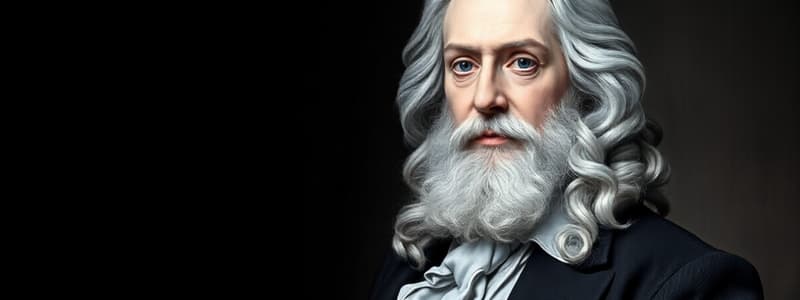Podcast
Questions and Answers
What is the primary purpose of government according to John Locke?
What is the primary purpose of government according to John Locke?
- To enforce religious laws and morals
- To maintain social order through strict regulations
- To protect natural rights, especially property (correct)
- To achieve collective economic prosperity
What justification does Locke provide for the right of revolution?
What justification does Locke provide for the right of revolution?
- Governments must promote economic equality
- Governments must protect natural rights or face overthrow (correct)
- Governments must maintain a military defense
- Governments must be elected by popular vote
In Locke's view, what makes the state of nature increasingly unsafe?
In Locke's view, what makes the state of nature increasingly unsafe?
- The inherent greed of individuals
- The unequal distribution of wealth among individuals
- The inevitability of territorial wars
- The absence of a governing authority to resolve disputes (correct)
Which historical event reflects John Locke's ideas on political society?
Which historical event reflects John Locke's ideas on political society?
How does Locke's view of the state of nature differ from that of Hobbes?
How does Locke's view of the state of nature differ from that of Hobbes?
What is necessary for a legitimate government according to Locke?
What is necessary for a legitimate government according to Locke?
Which modern event exemplifies Locke's justification for opposing repressive regimes?
Which modern event exemplifies Locke's justification for opposing repressive regimes?
What aspect of dissent does Locke's social contract concept assume?
What aspect of dissent does Locke's social contract concept assume?
What is one primary consequence of capitalism as seen by Marx and Engels?
What is one primary consequence of capitalism as seen by Marx and Engels?
How does Friedman view the role of profit maximization for businesses?
How does Friedman view the role of profit maximization for businesses?
What fundamental change does Marx advocate to eliminate exploitation?
What fundamental change does Marx advocate to eliminate exploitation?
What aspect of capitalism does Marx believe leads to economic downturns?
What aspect of capitalism does Marx believe leads to economic downturns?
How do modern debates over wealth inequality reflect Marxist ideas?
How do modern debates over wealth inequality reflect Marxist ideas?
What do Marxists see as a primary function of corporations within capitalism?
What do Marxists see as a primary function of corporations within capitalism?
What does Friedman suggest to address market failures?
What does Friedman suggest to address market failures?
What do both Marx's critique of capitalism and Friedman's focus on profit maximization have in common?
What do both Marx's critique of capitalism and Friedman's focus on profit maximization have in common?
What is the primary concern associated with suppressing dissenting opinions in society?
What is the primary concern associated with suppressing dissenting opinions in society?
What does the Harm Principle state regarding freedom of speech?
What does the Harm Principle state regarding freedom of speech?
How does Mill view the role of false speech in society?
How does Mill view the role of false speech in society?
What does Mill believe is essential for preventing societal stagnation?
What does Mill believe is essential for preventing societal stagnation?
What criticism do Locke's theories face regarding consent?
What criticism do Locke's theories face regarding consent?
How does Friedman view the relationship between businesses and social responsibility?
How does Friedman view the relationship between businesses and social responsibility?
What vision do Marx and Engels advocate for in their critique of capitalism?
What vision do Marx and Engels advocate for in their critique of capitalism?
What is a significant drawback of capitalism according to Marx and Engels?
What is a significant drawback of capitalism according to Marx and Engels?
What does Mill suggest about modern speech regulation, such as hate speech laws?
What does Mill suggest about modern speech regulation, such as hate speech laws?
What role does Mill believe government should play in individual freedoms?
What role does Mill believe government should play in individual freedoms?
What aspect of freedom does Locke emphasize as foundational to his philosophy?
What aspect of freedom does Locke emphasize as foundational to his philosophy?
What is a counterargument to Friedman’s view on corporate responsibility?
What is a counterargument to Friedman’s view on corporate responsibility?
What key concept distinguishes Mill’s view of liberty from Locke’s?
What key concept distinguishes Mill’s view of liberty from Locke’s?
According to Mill, what is a major consequence of a marketplace of ideas?
According to Mill, what is a major consequence of a marketplace of ideas?
Flashcards
State of Nature
State of Nature
A state where individuals are free and equal, governed by natural law accessible through reason, which dictates protecting life, liberty, and possessions. However, lacking a governing authority makes it unsafe over time.
Social Contract
Social Contract
Individuals voluntarily agreeing to form a government, surrendering some freedoms in exchange for protection of their natural rights. This agreement forms the basis for legitimate governance.
Purpose of Government
Purpose of Government
The main purpose of government is to safeguard natural rights – life, liberty, and property. Any government action exceeding this purpose, like infringing on individual rights, is unacceptable.
Right of Revolution
Right of Revolution
Signup and view all the flashcards
Constitutionalism
Constitutionalism
Signup and view all the flashcards
Modern Application
Modern Application
Signup and view all the flashcards
Leaving a Country
Leaving a Country
Signup and view all the flashcards
Hobbes vs. Locke
Hobbes vs. Locke
Signup and view all the flashcards
Marxist view of capitalism's contradiction
Marxist view of capitalism's contradiction
Signup and view all the flashcards
Marxist vision of communism
Marxist vision of communism
Signup and view all the flashcards
Friedman's view on profit maximization
Friedman's view on profit maximization
Signup and view all the flashcards
Surplus value in capitalism
Surplus value in capitalism
Signup and view all the flashcards
Capitalist crises in Marxist theory
Capitalist crises in Marxist theory
Signup and view all the flashcards
Efficiency vs. exploitation
Efficiency vs. exploitation
Signup and view all the flashcards
Corporations in Friedman and Marx's perspectives
Corporations in Friedman and Marx's perspectives
Signup and view all the flashcards
Friedman vs. Marx on solutions
Friedman vs. Marx on solutions
Signup and view all the flashcards
John Stuart Mill's Harm Principle
John Stuart Mill's Harm Principle
Signup and view all the flashcards
Marketplace of Ideas
Marketplace of Ideas
Signup and view all the flashcards
Value of Diverse Opinions (Mill)
Value of Diverse Opinions (Mill)
Signup and view all the flashcards
Locke's Social Contract
Locke's Social Contract
Signup and view all the flashcards
Locke's View of Property Rights
Locke's View of Property Rights
Signup and view all the flashcards
Profit Maximization (Friedman)
Profit Maximization (Friedman)
Signup and view all the flashcards
Friedman's Critique of Corporate Social Responsibility (CSR)
Friedman's Critique of Corporate Social Responsibility (CSR)
Signup and view all the flashcards
Class Struggle (Marx & Engels)
Class Struggle (Marx & Engels)
Signup and view all the flashcards
Marx & Engels' Critique of Capitalism
Marx & Engels' Critique of Capitalism
Signup and view all the flashcards
Communist Vision (Marx & Engels)
Communist Vision (Marx & Engels)
Signup and view all the flashcards
Freedom of Thought & Expression (Mill)
Freedom of Thought & Expression (Mill)
Signup and view all the flashcards
Individuality and Freedom (Mill)
Individuality and Freedom (Mill)
Signup and view all the flashcards
Value of False Speech (Mill)
Value of False Speech (Mill)
Signup and view all the flashcards
Mill's View on Offensive Speech
Mill's View on Offensive Speech
Signup and view all the flashcards
Criticisms of Locke's Property Rights
Criticisms of Locke's Property Rights
Signup and view all the flashcards
Defining 'Harm' in Mill
Defining 'Harm' in Mill
Signup and view all the flashcards
Study Notes
John Locke
- State of Nature: Individuals are free, equal, and governed by natural law (reason dictates no harm to others affecting life, liberty, or possessions). Lack of governing authority creates insecurity.
- Political Societies: Formed through consent to escape insecurity. Requires surrendering some freedoms for the protection of natural rights. Legitimate governments arise from consent of the governed.
- Purpose of Government: Primarily to protect natural rights (life, liberty, property). Any actions exceeding this are unjustified.
- Right of Revolution: Citizens have the right (and duty) to overthrow governments that fail to protect natural rights or act against the common good. Influential in historical rebellions.
- Context: Late 17th-century defense of constitutionalism against absolutism. Influenced Enlightenment and foundational documents (US Declaration & Constitution).
- Examples: Glorious Revolution (1688-1689) exemplified Locke's ideas. Modern movements for democracy echo his principles against oppression.
- Key Question/Answer - Leaving a Country: Locke's theory assumes mobility and opportunity, not always realistic. Critics highlight difficulties facing those lacking mobility due to inequalities.
John Stuart Mill
- Freedom of Thought and Expression: All opinions (even false ones) have value, revealing or refining truth. Suppression of dissent leads to stagnation and tyranny.
- Harm Principle: Individual freedom (including speech) restricted only to prevent harm to others. Offense or controversy does not equal harm.
- Marketplace of Ideas: Competition of ideas drives progress. Diverse viewpoints strengthen understanding and innovation.
- Fallibility of Censorship: Censorship assumes infallibility, an unattainable certainty. All views must be considered to promote best ideas.
- Context: Victorian era debates on censorship and morality. Mill's arguments support modern debates on free speech and cancel culture.
- Examples: Abolitionist and suffrage movements utilized free speech to challenge norms. Social media amplifies concerns about balancing free expression with harm.
- Key Question/Answer - False Speech: False speech is necessary to test and strengthen truths. Suppressing false speech denies society opportunities to affirm principles.
Milton Friedman
- Profit Maximization: Businesses best serve society by maximizing profits legally. This prioritizes shareholder interests and market efficiency.
- Critique of Corporate Social Responsibility (CSR): Addressing social issues dilutes business efficiency. Government and private individuals are better equipped to handle these concerns.
- Role of Government and Business: A division of labor where businesses focus on economic objectives, and governments address social welfare.
- Context: Neoliberalism's rise. Shaped late 20th-century corporate governance and remains controversial.
- Examples: 1980s shareholder capitalism emphasized Friedman's ideas. Modern debates on environmental initiatives show the balance between CSR and profits.
- Key Question/Answer - Argument for Profit Maximization: Profit-driven companies promote innovation, economic growth, and employment, indirectly benefiting society.
Marx & Engels
- Class Struggle: History is driven by conflicts between oppressors (bourgeoisie) and oppressed (proletariat).
- Critique of Capitalism: Commodifies labor, exacerbates inequality, and benefits few at the expense of many. Prone to crises and ultimately self-destructive.
- Communist Vision: Advocates for a classless society, sharing wealth and power (abolishing private ownership).
- Advantages of Capitalism: Capitalism revolutionizes production and globalizes markets, laying foundations for socialism.
- Context: Industrial upheaval. Inspired communist revolutions and continues to critique global capitalism.
- Examples: Russian Revolution (example of implementation). Modern debates on wealth inequality, gig economies, and universal basic income reflect these critiques.
- Key Question/Answer - Capitalism Contradictions: Creates wealth but concentrates it, leading to instability and worker revolts.
Studying That Suits You
Use AI to generate personalized quizzes and flashcards to suit your learning preferences.




